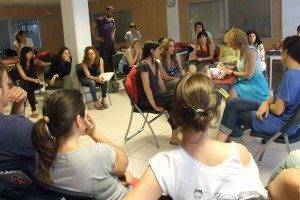Daily use of a probiotic early in life reduced inconsolable crying, spitting up / positing and functional constipation in newborns reports a new study in JAMA No adverse events were reported by parents and the supplements were well tolerated.
Although infantile colic is not considered a serious problem by the medical profession, 10% to 20% of all pediatrician visits in the first 4 months are related to this issue.
Colicky crying frequently contributes to anxiety, exhaustion, and stress.
Posseting / positing / spitting up is very common (around 50% of babies do this for at least their first 12 weeks, some for much longer).
Constipation can be a real issue for both the baby and the family – with little ones being really uncomfortable in the days leading up to a bowel movement, as well as crying considerably beforehand in some cases.
What are called “functional gastrointestinal disorders” in newborns usually gets better of their own accord. Help from probiotics may be really useful until it does.
A newborn check by a qualified paediatric osteopath may also highlight other issues that could benefit from some gentle osteopathic support.
